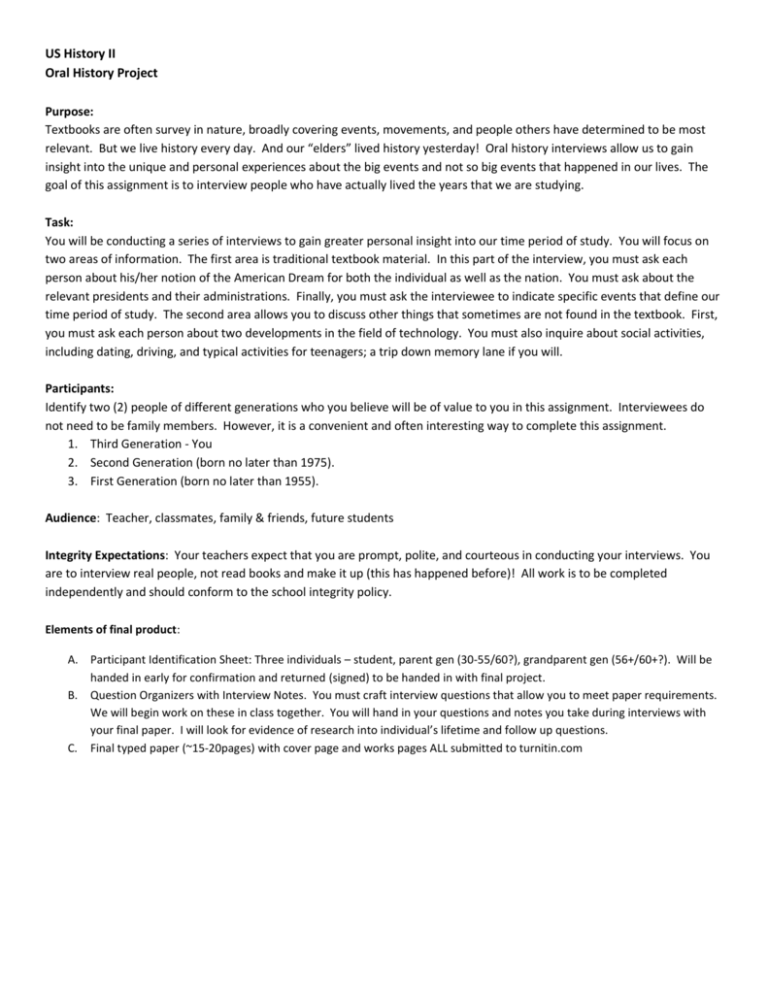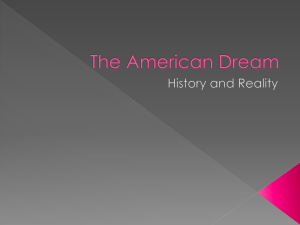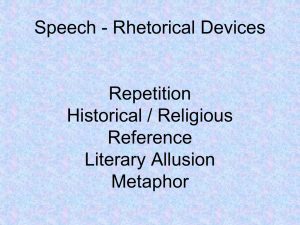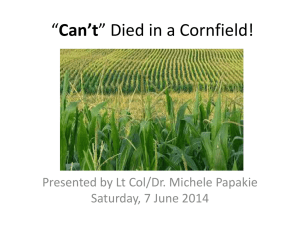Modified Oral History Assignment
advertisement

US History II Oral History Project Purpose: Textbooks are often survey in nature, broadly covering events, movements, and people others have determined to be most relevant. But we live history every day. And our “elders” lived history yesterday! Oral history interviews allow us to gain insight into the unique and personal experiences about the big events and not so big events that happened in our lives. The goal of this assignment is to interview people who have actually lived the years that we are studying. Task: You will be conducting a series of interviews to gain greater personal insight into our time period of study. You will focus on two areas of information. The first area is traditional textbook material. In this part of the interview, you must ask each person about his/her notion of the American Dream for both the individual as well as the nation. You must ask about the relevant presidents and their administrations. Finally, you must ask the interviewee to indicate specific events that define our time period of study. The second area allows you to discuss other things that sometimes are not found in the textbook. First, you must ask each person about two developments in the field of technology. You must also inquire about social activities, including dating, driving, and typical activities for teenagers; a trip down memory lane if you will. Participants: Identify two (2) people of different generations who you believe will be of value to you in this assignment. Interviewees do not need to be family members. However, it is a convenient and often interesting way to complete this assignment. 1. Third Generation - You 2. Second Generation (born no later than 1975). 3. First Generation (born no later than 1955). Audience: Teacher, classmates, family & friends, future students Integrity Expectations: Your teachers expect that you are prompt, polite, and courteous in conducting your interviews. You are to interview real people, not read books and make it up (this has happened before)! All work is to be completed independently and should conform to the school integrity policy. Elements of final product: A. Participant Identification Sheet: Three individuals – student, parent gen (30-55/60?), grandparent gen (56+/60+?). Will be handed in early for confirmation and returned (signed) to be handed in with final project. B. Question Organizers with Interview Notes. You must craft interview questions that allow you to meet paper requirements. We will begin work on these in class together. You will hand in your questions and notes you take during interviews with your final paper. I will look for evidence of research into individual’s lifetime and follow up questions. C. Final typed paper (~15-20pages) with cover page and works pages ALL submitted to turnitin.com US History II Oral History Project Participant Identification Sheet Part I of this project asks you to identify two (2) different generations who you believe will be of value to you in this assignment. While desirable, it will NOT be necessary to maintain the same two individuals for the remaining segments of this activity, but you must notify the teacher of any changes. PRINT ALL INFORMATION CLEARLY. (25 Points) Person 1 – Third Generation (You) Age: DOB: Person 2 – Second Generation (formerly known as Parent Generation), born no later than 1975. Age: DOB: Selection Justification: Person 3 – First Generation (formerly known as Grandparent Generation), born no later than 1955. Age: Selection Justification: DOB: Oral History Components for Each Individual – Organization for Final Paper Part I: American Dream (~2-3 pgs) A. How would you define the American Dream at the following points in your life: As an individual in your teens, twenties and thirties, forties-sixties, in your later years? In what years were you those ages? (I want them to assess how their goals may have changed at various points in their lifetime – if they can identify specific shifts in thought & action and it’s outside these decade parameters, that is okay). How has your Dream evolved? Do you feel you’ve accomplished your Dream? If you have children/grandchildren, what is your vision of the Dream for them? B. How have the goals for the nation changed throughout your adulthood? How has our role in the world and global perception of us changed? Expand (why, how, etc.) Part II: “When I Was Your Age…”- A brief trip down memory lane. (~2-3 pgs) A. What was life like for you when you were my age (family roles & routines, dating & driving practices, food & dress, school & entertainment)? In what time frame were you my age? Part III: Oral History – This part should demonstrate evidence and knowledge of historical events detailed by first-person perspective. Be sure to provide background that explains the event (you will need to find and cite background sources to better understand) and use quotes from the interview to identify their personal experience with it (involvement, feeling, significance)? These pages should institute the bulk of the project (~8-10 pgs) as it is oral history. A. What have been the 3 most significant political events, social events, and military events of your lifetime? Why do you identify these 9 events in particular? How have they impacted the American Dream? B. How has technology changed over your lifespan? What have been the two biggest technological advancements of your lifetime, and why? How does technology impact the American Dream? Part IV: Citizenship (~2-3 pgs) A. Have you been an active voter – why or why not? Who do you think has been the best president of your lifetime and why? Who has been the worst and why? How have each of their actions impacted the American Dream and nation? How has the political process and landscape of American democracy changed during your lifetime? Part V: Reflection (~1 pg) A. Why is oral history important and what have you learned from this process? This is to be answered only by the student, although student may discuss relevance with interviewees to gain insight. Works Cited/Consulted – Anything you used to create questions or to better understand events outside your lifetime. If you quote information in your paper or used a source to identify background for an event or person, cite it in your paper. What you read for background will be consulted. Don’t forget to do proper citations for interviews! Alphabetize all sources. Ex: Eickhoff, Alan. Personal interview. 4 July 2012. Student Name: ______________________________________ Block: _________ Springfield Township High School US History II—Oral History Scoring Guide Category Product Components Content Writing Skills Conventions Documentation Criteria Product includes the following components: ___cover page ___completed organizer ___works cited ___interview notes ___completed paper ___ turn-it-in submission (typed, double-spaced) Notes *Paper will be rejected if any Score component is missing – 10% deduction/day will apply! /5 Explores development of American Dream for individuals and nation Discusses changes in social behaviors and culture since individuals were adolescents. Discusses significant events from all categories and evaluates their impact on the American Dream. Discusses technological innovations and evaluates the impact of these changes on the American Dream for individuals or nation. Discusses citizenship and American democracy and evaluates presidential administrations from individuals lifetime, including impact on American Dream. Reflection assesses importance of project and impact on student. /15 /15 /25 /15 /15 /10 Synthesis Author effectively synthesizes information and structures in narrative format Evaluation Author effectively evaluates information gathered in interviews and demonstrates ability to choose information necessary to tell a meaningful story Organization Author communicates information with organization and clarity. /10 /10 /10 Conventions Product contains no grammar, spelling, or punctuation mistakes, and demonstrates evident control of usage and sentence formation. /10 Documentation Information is documented in MLA format and visible to the audience. Works cited is properly formatted and included in product. /10 Total Points /150




